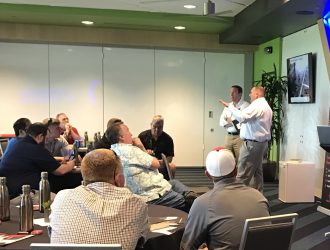Most companies aspire to get their CEO or subject matter experts quoted in a Wall Street Journal feature or a Reuters wire story. Why? It gives them added credibility among their peers and potential customers.
When we talk to clients about their media outreach goals, we emphasize that it’s not easy to get into national media outlets and might not always be desirable (negative crisis situations come to mind).
But if we determine with our clients that they have something to say that might be worthy of a major national publication or broadcast show, there’s still one major step to go: Find the right timing to present that source and his/her POV to the reporter.
That’s where newsjacking comes in.
Newsjacking is when you contact a journalist working on a breaking news story and offer a relevant source with insight who could be a key part of the story. By being opportunistic, you’ll have a much better success rate of getting an interview for your expert than just cold-contacting a reporter with what you believe is an awesome story idea.
For example, when there is a major merger related to the food and beverage industry — such as the Amazon acquisition of Whole Foods — we’re ready to act in a moment’s notice to offer insights from one of our clients’ experts to journalists who are working on stories. Timely outreach has helped us get placements in national, industry trade and local/regional outlets time and time again, resulting in recognition such as a first place national media relations award that focused on our ability to build thought leadership for a client.
So, how do you newsjack? Here are 3 tips for obtaining more and better coverage.
EXECUTIVE SUMMARY
MONITOR INDUSTRY DEVELOPMENTS.
In addition to reading relevant newspapers, following key reporters and watching broadcast network shows that cover your industry, set up Google Alerts to be notified immediately when something major happens. Following key reporters and topics on Twitter is another great way to stay on top of the news.
The goal is to not only be notified of breaking news but to give yourself a chance to get ahead of the news. New legislation expected to pass that is of high importance in your industry? Keep your eye on it and strike while the iron is hot, which could be right before it passes. Let reporters know you’re following their coverage of the issue, and let them know your expert is available to comment as soon as the bill passes.
BE DEPENDABLE AND PREPARED.
You need to go all-in because you’re promising a reporter or producer that you’ll deliver exactly what they need, when they need it. If you mess up a possible newsjacking interview because the source is late, isn’t prepared, etc., you’ve lost your credibility and might not recover. Conversely, if you’re reliable, it’s much more likely media outlets will come back for more.
If you’re going to capitalize on a newsjacking opportunity, make sure the interview source isn’t someone who gets rattled easily when summoned to an interview at a moment’s notice. Newsjacking works best when the source is already media trained, as you might not have time to even do a quick run-through before the call/broadcast. Make sure your SMEs, executives and other sources understand that this is likely to happen from time to time, and give them an early heads-up if it looks like you’ll call on them for an interview that day.
MOVE FAST.
Get key points from your interview sources as soon as possible. When breaking news happens, the earlier you get that information in front of reporter and producers, the better. Within a couple of hours is ideal.
Journalists are working against tight deadlines — remember, they’re all competing against each other to get the first and best story on the web or on air — and they might choose to interview the first one or two trustworthy sources who reach out to them. This is especially true for TV because more complicated logistics are involved and producers are typically confirming interview arrangements for evening news programs that morning.
If you miss the first wave of breaking news, all hope is not lost. It’s likely that some reporters will be working on more in-depth stories about the topic that could publish later in the day or week. You’ll want to offer fresh insights or a unique perspective that hasn’t been widely published already.
BE DIFFERENT.
If you can’t be first, be different. Regardless of timing, try to offer a unique or possibly contrarian perspective. Remember that journalists are selecting sources from a wide pool and they want to share information — usually quotes — that will resonate. Think about what aspects of the story haven’t already been covered or what could happen next.
In this example, we positioned a client expert to discuss whether or not Midwest flooding would affect consumer food prices (it didn’t). Forward-looking analysis is typically much appreciated by reporters and their editors.
I’ll leave you with one last tip: Don’t force it. If you try too hard to make a connection to a major news event, it might backfire. This is especially true if it’s a tragic event and your outreach seems inappropriate.
If you play your cards right, you’ll be a reliable, go-to source for news organizations that need the right expert at the perfect time.



